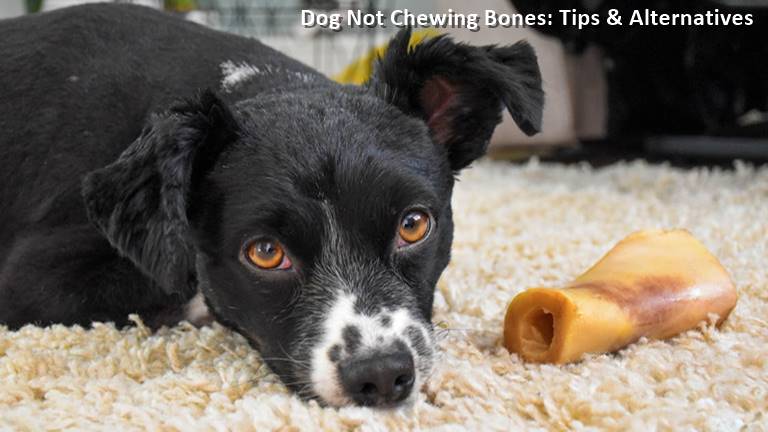Not all dogs are the same, and some may not enjoy chewing bones as much as others. While bones can provide necessary nutrients and dental benefits, it’s important to respect your dog’s preferences and find other ways to keep their teeth healthy. If you’re wondering what to do if your dog doesn’t chew bones, there are plenty of alternatives that can help.
First, it’s important to understand why your dog may not be interested in chewing bones. Some dogs may have dental issues or missing teeth that make it difficult or uncomfortable to chew. Others may simply prefer different textures or flavors. Whatever the reason, there are many other options available that can provide similar benefits.
Reasons Why Your Dog Doesn’t Chew Bones
While bones can be a great source of minerals and other nutrients for dogs, not all dogs enjoy chewing on them. If your dog doesn’t seem interested in chewing bones, there could be a few reasons why.
Dental Problems
If your dog has dental problems, such as missing or broken teeth, it may be painful for them to chew on bones. In this case, it’s important to consult with your veterinarian to determine the best course of action. They may recommend a dental cleaning or other treatment to help alleviate the pain and discomfort.
Digestive Issues
Another reason why your dog may not be interested in chewing bones is if they have digestive issues. For example, if your dog has a sensitive stomach, bones may cause digestive upset. Additionally, if your dog has a history of gastrointestinal problems, such as blockages or obstructions, it’s best to avoid giving them bones altogether.
Behavioral or Training Issues
Sometimes, dogs simply don’t know how to chew bones or need to be trained to do so. If your dog is a puppy or hasn’t been exposed to bones before, they may need some guidance and encouragement to start chewing. Additionally, if your dog has a history of resource guarding or aggression, they may not feel comfortable sharing bones with other dogs or people.
If you suspect that your dog’s lack of interest in bones is due to a behavioral or training issue, it’s important to work with a professional dog trainer or behaviorist to address the problem. They can help you develop a training plan that is tailored to your dog’s specific needs and personality.
Tips to Encourage Your Dog to Chew Bones
As we have discussed some possible reasons for dogs not being interested in chewing bones, let’s now discuss some methods that can help a dog learn to chew bones.
Understanding Dog’s Preferences
Dogs, like humans, have unique preferences when it comes to food and treats. Some dogs may prefer softer chews while others enjoy harder bones. It’s important to pay attention to your dog’s preferences about what they like to eat or chew and try different types of bones or chews to find what they enjoy. It’s also important to ensure that the bones or chews are appropriate for your dog‘s size and breed.
Add Some Flavor
Just like humans, dogs can be enticed by the scent and taste of food. Consider adding a small amount of peanut butter or low-sodium chicken broth to the bones or chews to make them more appealing. This can also help your dog associate the bones with positive experiences.
Make it a Game
Dogs love to play and engage in activities with their owners. Try playing a game with your dog using the bones or chews. For example, you can hide the bone and encourage your dog to find it. This can make the chewing experience more enjoyable and rewarding for your dog.
Safe Alternatives to Bones for Your Dog
If you are concerned about the safety of giving your dog bones, there are plenty of other options that can satisfy their need to chew. Here are some safe alternatives to bones:
Rawhide Chew Toys
Rawhide chew toys are a popular alternative to bones. They are made from the inner layer of cow or horse hides and are often flavored to make them more appealing to dogs. Rawhide chews can help clean your dog’s teeth and satisfy their urge to chew, but it’s important to choose high-quality chews that are made from natural ingredients and are free from harmful chemicals.
Dental Chews
Dental chews are specially designed to help clean your dog’s teeth and freshen their breath. They come in a variety of shapes and flavors, and some even contain ingredients like enzymes and antioxidants to promote good oral health. Dental chews can be a great alternative to bones, but make sure to choose a product that is appropriate for your dog’s size and chewing habits.
Antlers and Horns
Antlers and horns are another popular alternative to bones. They are made from naturally shed deer or elk antlers, and can provide a long-lasting chew for your dog. Antlers and horns are also rich in minerals like calcium and phosphorus, which can help support your dog’s bone health.
Vegetables and Fruits
Vegetables and fruits can also be a great alternative to bones. Carrots, celery, and apples are all low calorie, high fiber options that can help clean your dog’s teeth and provide them with important nutrients. Just make sure to cut fruits and vegetables into bite-sized pieces to prevent choking.
Commercial Dog Treats
There are many commercial dog treats on the market that can provide a safe and healthy alternative to bones. Look for treats that are made from natural ingredients and are free from artificial preservatives and flavors. You can also choose treats that are specifically designed to promote good oral health, like Greenies or Whimzees.
Types of Bones to Avoid
Not all bones are created equal. Some bones are safer than others, while some should be avoided altogether. Here are some types of bones to avoid giving your dog:
| Bone to Avoid | Why They’re Unsafe |
| Chicken bones | Small and brittle, can easily splinter and cause harm to the mouth and digestive system |
| Pork bones | Small and can easily splinter, causing harm to the mouth and digestive system |
| Rib bones | Thin and can easily break, causing harm to the mouth and digestive system |
| Marbled bones | High in fat and can cause pancreatitis if consumed in large quantities |
It’s important to note that not all bones are unsafe for dogs. However, it’s best to consult with your veterinarian before giving your dog any type of bone to ensure that it’s safe for them to consume.


